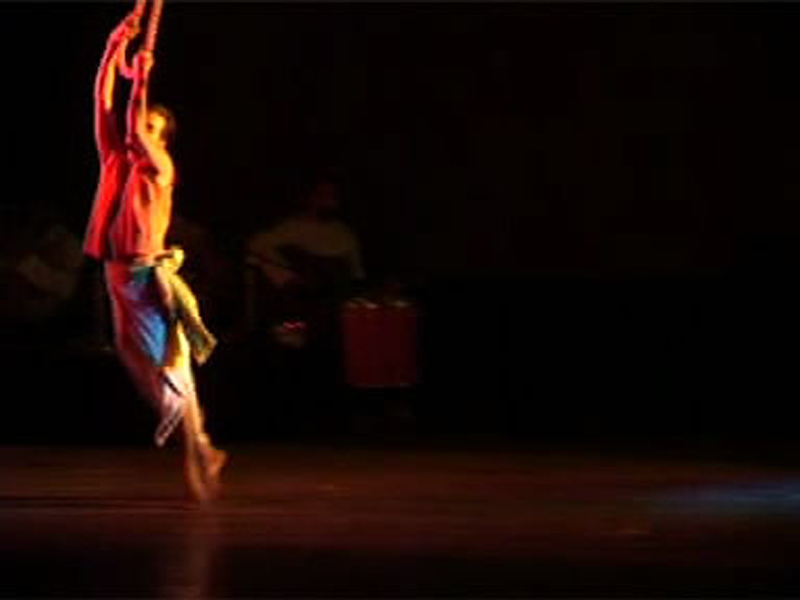Jhuma Basak




New Performance
2005-2006
Grant Period: over 5 months
“To dance it was not enough to learn only how to dance as a skill; it was important to read poetry, watch theatre, see paintings/sculptures, listen to different kinds of music, be politically aware – only then one could actually dance” says Jhuma Basak, a dancer, choreographer and psychoanalyst. Having trained in Odissi dance, Bharatanatyam and Kathakali, Jhuma later found that theatre has greater vibrancy than contemporary dance, partly because it has the advantage of using the spoken word and partly because it constantly experiments with and incorporates other forms of expression, including dance. Her dissatisfaction with her practice, heightened by her exposure to other art forms, has led her to search for alternative expression through a form of dance-theatre, which, she feels, can better express the complexity of contemporary life. Her first creations of Versedance, as this form is called, were based on poetry by Shakespeare, Pablo Neruda and Meena Kumari, which explore the theme of ‘love and temporality’.
Versedance uses a non-linear, non-literal form of expression, often following a multiple narrative pattern, for a holistic presentation of the poems. The independent script created out of the original text holds an interesting theatrical flavour, adding a dramatic element to the abstract quality of verse. In Versedance, literature, theatre, music, dance and painting ‘play’ together, sometimes complementing each other, while at other times working against each other to create this new genre of physical language. The result is that the performance is not reduced to a mere ‘representation’ of the poems.
This grant will enable Jhuma to create a second set of three pieces, extending her exploration of the possibilities of Versedance. This time she has selected poems by Rainer Maria Rilke, Amrita Preetam Singh and Jibonananda Das. The proposed dance-theatre pieces, each running for around 20 to 25 minutes, will explore the same theme of ‘love and temporality’ but will seek to capture the different flavours of the languages in which the poems have been written (German, Punjabi and Bengali), the cultures they represent, and how love has been understood and expressed in them.
Jhuma also plans to extend Versedance into an academic context, exploring how working with the form might become a regular part of the curriculum. She will work with two groups of students, one from Jadavpur University and the other from Presidency College, on a poem from their respective syllabi. The Versedance pieces will be developed through dialogues between the students involved in the performance, with the larger body of students and faculty in the concerned departments coming in at different stages to provide critical inputs. The working process will be documented in the form of writing, sketches and photographs, while the performances themselves and the ensuing dialogue between the student performers and the audience will be documented in audio-visual form to create a record for future reference.
Versedance uses a non-linear, non-literal form of expression, often following a multiple narrative pattern, for a holistic presentation of the poems. The independent script created out of the original text holds an interesting theatrical flavour, adding a dramatic element to the abstract quality of verse. In Versedance, literature, theatre, music, dance and painting ‘play’ together, sometimes complementing each other, while at other times working against each other to create this new genre of physical language. The result is that the performance is not reduced to a mere ‘representation’ of the poems.
This grant will enable Jhuma to create a second set of three pieces, extending her exploration of the possibilities of Versedance. This time she has selected poems by Rainer Maria Rilke, Amrita Preetam Singh and Jibonananda Das. The proposed dance-theatre pieces, each running for around 20 to 25 minutes, will explore the same theme of ‘love and temporality’ but will seek to capture the different flavours of the languages in which the poems have been written (German, Punjabi and Bengali), the cultures they represent, and how love has been understood and expressed in them.
Jhuma also plans to extend Versedance into an academic context, exploring how working with the form might become a regular part of the curriculum. She will work with two groups of students, one from Jadavpur University and the other from Presidency College, on a poem from their respective syllabi. The Versedance pieces will be developed through dialogues between the students involved in the performance, with the larger body of students and faculty in the concerned departments coming in at different stages to provide critical inputs. The working process will be documented in the form of writing, sketches and photographs, while the performances themselves and the ensuing dialogue between the student performers and the audience will be documented in audio-visual form to create a record for future reference.
